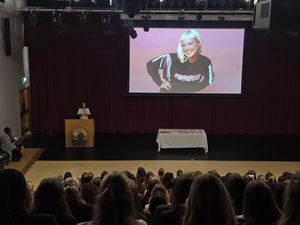An abuse of anonymity?
Is ratemyteachers.com helping education or undermining teachers?
 Website ratemyteachers.com has been criticised for undermining teachers' authority. The firm behind it, however, says it is helping education. Andrew Owen tries to find out who is right.
Website ratemyteachers.com has been criticised for undermining teachers' authority. The firm behind it, however, says it is helping education. Andrew Owen tries to find out who is right.
Mrs Jones is a teacher in a south Shropshire school – and according to one of her pupils she is "quite possibly the worst teacher ever!".
I know this because the pupil wrote about Mrs Jones (not her real name) on the website ratemyteachers.com.
The site, which is based in America, does exactly what its name suggests. It allows any pupil anywhere in the world to mark a teacher for how helpful he or she is, how well a subject is presented, and the teacher's "overall quality".
The site boasts more than 10 million ratings for 1.5 million teachers.
All the ratings are anonymous.
By logging on, anyone anywhere can see what pupils are saying about those who are trying to educate them – and in some cases they are not saying anything nice. ("Hands down the worst teacher I have ever had in my high school experience", is how one American student describes her English teacher.)
But should teachers be subjected to this sort of scrutiny? Is it fair that pupils can write about their teachers for the world to see?
The people behind ratemyteachers.com claim they are performing a valuable service by allowing children's voices to be heard. They claim to be dedicated to improving education and say 70 per cent of ratings are positive.
Teachers, on the other hand, take a somewhat different view.
"I think it's disgraceful, to be honest," says Dave Hill, head of the Burton Borough School in Newport.
"Anyone can log on under any name, they can't be traced, and they can say what they like, accurate or not."
Mr Hill, who admits to looking at the site occasionally, believes ratemyteachers.com amounts to little more than online bullying.
And what really irks him is the fact that the site appears to suggest that the way to deal with a problem is to post an anonymous comment.
School staff do their best to listen to pupils' opinions, he says, and there are support managers who act as an impartial "listening ear".
But websites such as ratemyteachers go against that, he argues. Instead of dealing with issues through communication, the site is open to pupils who want to "get their own back" over something that may have happened in school.
"It's an abuse of anonymity," says Mr Hill. He agrees that there is a freedom of speech issue, but he argues that to have that right there has to be accountability.
"Ratemyteachers promotes the sort of behaviour that we say in society should be stamped out. It's contrary to the way that we work in society."
Liz Nicholson, director of children and young people's services at Shropshire Council, also questions the approach, saying: "The views of pupils are of course important, and the council has robust staff review processes in place, as well as the Ofsted inspection regime that carries out a professional judgement on the quality of teachers.
Damaging
"Websites such as this, although possibly considered to be fun by some, are unlikely to offer any greater insight into the quality of education Shropshire children are receiving. We would encourage pupils to talk to a trusted member of staff if they have any issues with their teachers, rather than posting on a website which could be quite damaging with inaccurate or inappropriate comments."
These opinions are shared by Paul Bowen, who teaches psychology and manages the psychology curriculum at New College in Wellington.
"As far as we are concerned students have ample opportunity to comment. As teachers we positively encourage that because we want to give the best teaching that we can."
As a psychologist, Mr Bowen is also concerned about the effect negative comments can have on teachers.
"My best advice to teachers is not to access these sites because they could have a detrimental impact on a person's psychological well-being."
Perhaps unsurprisingly, the people behind ratemyteachers.com disagree with Shropshire teachers' concerns.
In an email from the site's head office in Baltimore, Justin Boswell, its director of Administration, wrote: "Unfortunately not all comments on our site are positive, but we feel that negative comments have just as much ground.
"When contacted we suggest that teachers take our comments with a grain of salt ... They shouldn't quit the profession over one bad comment. A string of bad comments is something for them to think about, and with such responses normally comes a reasonable amount of feedback for the teacher to improve on.
"As mentioned, we believe that teachers need to take on board the information that we have the ability to relay, but to take everything said to heart isn't the most appropriate method.
"In a few cases we believe the comments being made public is a help, it may be the reason a teacher picks to improve their methods, as other people can see what is written.
"We do notice the hard work teachers put in, but they also need to be held accountable for their actions, and to offer the best possible education for their students, which is our overall goal.
Mr Boswell denied that the site could encourage "bullying". He said teachers had a right of reply – interestingly, though, unlike those making the comments, teachers have to be able to prove their identity.
"We have offered a right of reply for several years, in the feature of a teacher account. For those teachers who would like to respond to ratings left under their name, be those ratings good or bad, they may. All they need to do is prove their identity, normally in the form of a school issued email address and they are able to say thank you or refute ratings as they wish.
"To prevent any sort of 'online bullying' we also have a strict set of rules which we enforce, using our large team of student moderators to assist us.
"Each comment must pass through at least one stage of moderation before it is allowed on to the site itself, and once on the site it can be reported by any member of the public. Once a rating has been reported then our staff will take a look at it and ensure it should be on the site." (Presumably the "worst teacher ever!" will be pleased to hear that.)
Ratemyteachers also defends the use of anonymity. "Unfortunately as much as schools attempt to encourage student review, students will always feel a level of unease in talking to members of staff, management or support workers.
"We offer students a place to voice their experiences and opinions in an environment which they feel comfortable in, and do not fear any sort of retaliation from staff or management. Largely this isn't the fault of schools, it's human nature. Students worry about criticizing a school to members of staff, and justifiably so - they do not know what sort of treatment they may get after making what will normally be a reasonable request.
"It is also very hard to analyse teachers, their skill and ability for the positions they have been given. Most countries and schools have processes in place to assess these people, but an assessor placed in a classroom for a few hours doesn't really show a true indication of the teacher's skill; however a student that spends large amounts of time with the teacher in question does. Students are the people teachers are trying to reach, it is only fair that they have a voice in how they are taught."
Mr Boswell added: "We do not feel that we are the final solution, or voice, on the topic of education or cleaning up our schools, but more of a place to start. We encourage more public involvement in the education system. Teachers are charged with educating our next generation, they hold the future of our country in their hands, it is fair that we do the most we can to ensure they do the best job possible."
Dave Hill is not impressed. "There is no way that the site can check the accuracy of the comments. It is clearly possible for students to 'club together' and/or make things up which then appear on the website."
He asked: "Which other profession has a situation where anonymous comments/views about people's individual and personal 'performance' can be published publicly?
"I still feel that this site is (presumably) making money via encouragement to people to undermine teachers. If we don't express concerns about this site, then we can't also complain about teachers not enforcing discipline etc.
"To enable teachers to act in authority, as a society we have to show that we give them authority, and so reject attempts to undermine it."





